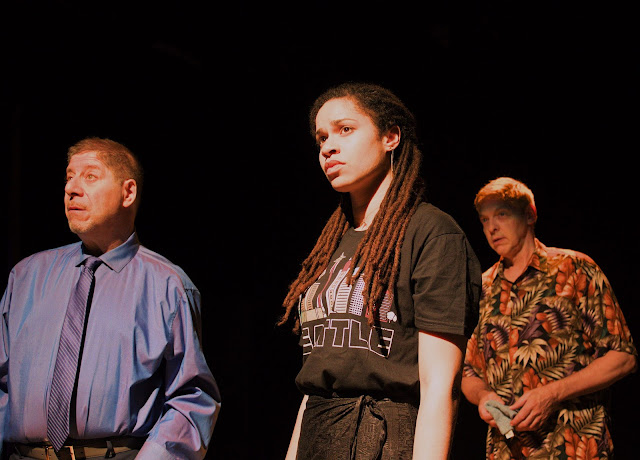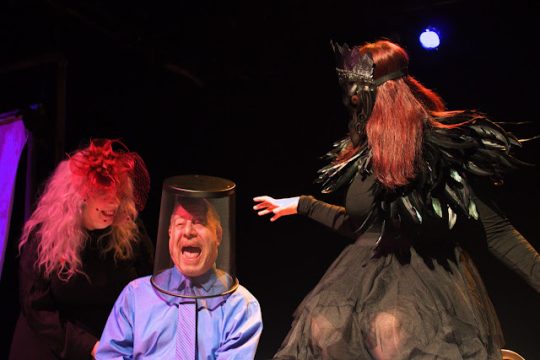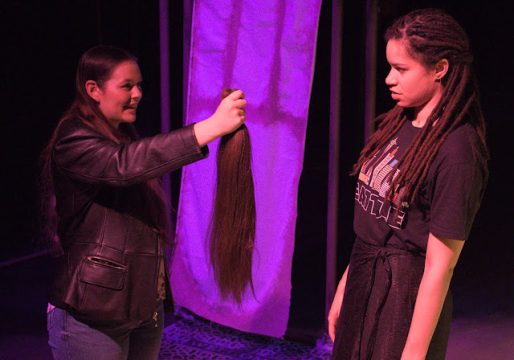
Presented by Manhattan Repertory Theatre at the Chain Theater
312 W. 36th Street, 3rd fl., Manhattan, NYC
April 5-14, 2024
It might seem odd (at least to non-horror fans) to describe a play featuring catastrophic illness, tragic loss, and a “dead baby cemetery” as great fun, but the socially conscious scares of Witchland certainly earn that designation. First performed in 2021, playwright Tim Mulligan’s story of a family who moves to a contaminated town and a house across the street from a locally infamous neighbor now brings its blend of spookiness and humor to midtown for a new production at the Chain Theater. Infused with creepy imagery and inventive staging, Witchland entertainingly explores the sicknesses that threaten both a family and a community, its outsiders included.
The titular Witchland is Mulligan’s native Richland, Washington, an area that hosted a site secretly producing atomic bombs beginning in the 1940s. Today, the Hanford Site, where cleanup efforts discovered “54 million gallons of highly radioactive sludge left from producing the plutonium in America’s atomic bombs,” remains “the largest and most contaminated of all the weapons production sites” and, according to a 2023 New York Times article, may never be properly cleaned up. At one point, a couple of site workers (Danny McWilliams and Nathan Cusson, providing a scene of comic relief not unlike a pair Shakespearean clowns) even discover unmapped barrels of waste in a tunnel; but lest we feel too insulated from this sort of thing, we might remember that barrels of carcinogenic hazardous waste have just been unexpectedly unearthed in Long Island on a site once used by the U.S. Navy and Northrop Grumman. When environmental engineer Jared (Dave Silberger) gets a high-paying offer to work at the Hanford Site, the high incidence of cancer among Richland residents–many of whom, parents and teens alike, we are told, work at the site–is one reason that his husband, Van (Geoffrey Grady) and their adopted daughter, Ali (Mars Holscher), object to relocating there from their Seattle apartment.

L to R: Theresa Della Valle, Dave Silberger, Chelsea Clark. Photo by Jordan Schreiber
Another reason for Van and Ali’s reluctance is their foreboding about how a pair of white fathers with a Black daughter will fit in Richland, far from Seattle’s urban progressivism. What they don’t yet know about is that Richland also has its very own witch (Theresa Della Valle), Judith, soon to be their near neighbor. Local lore claims that if one knocks over the Blair Witch-esque pyramidal arrangement of sticks outside of Judith’s house, it will reappear in its original configuration, and if one takes one of the sticks, that person will be cursed. In the play’s opening, following a sequence with dark figures, screams, and crow calls in the flickering gloom, we see a high schooler named Shannon (Nina Randazzo) unintentionally do the latter, egged on by alcohol and a dare from her boyfriend, Brett (Ben Wambeke). The next time we see Shannon, when she runs into classmate Ali and meets her family, Shannon is losing clumps of hair and acting strangely. By this point, unemployed former restaurant manager Van is beginning to slip back into what is suggested was a previously problematic drinking habit, and before long, Jared is having seizures, nightmares, and hallucinations. Are these threats to the affectionate, functional family dynamic established earlier in the play, like Judith’s own reputation as a witch, consequences of the environment (in both physical and social senses) or something more supernatural? And whatever the answer, what can high-school junior Ali do about any of it?

Nina Randazzo and Mars Holscher. Photo by Jordan Schreiber
The witch haunts a number of the scenes unseen by the other characters and usefully symbolic in her ambiguity. Her silent “double,” as the program terms her, who appears as an amalgam of bird and woman in an evocative movement-based performance by Chelsea Clark, often does the same. The production creates some authentically creepy moments, such as an incongruous cry issuing from the witch’s mouth, an instance when pecking from Judith’s double stops being seemingly ticklish, and a suggestion of Judith taking flight upon her double’s back. Witchland makes effective use of the entire space inside the theater (an early moment involving the double is particularly unsettling as well as indicative of things to come, and even the programs offer a touch of immersion), and Ken Wolf’s sound design, which includes periodic sirens that might put some in mind not only of nuclear disaster but also of the Silent Hill franchise, helps to maintain a suitably fearful atmosphere. At the same time, there are plenty of laughs to be had on the way to a rousing climax. The protagonists’–and townspeople’s–entrapment in toxic places by economic forces puts Witchland in conversation with a horror tradition represented by such narratives as The Amityville Horror, which Van namechecks. Economic struggle joins a nexus of generational trauma, scapegoating (easier, after all, to get one’s head around a single witch than a waste problem measured in thousands of years), and government malfeasance as thematic concerns, but the play preserves avenues of resistance, even as, like many a horror text, it subverts too-neat closure. You might not want to live in Witchland, but you won’t regret a visit.
-John R. Ziegler and Leah Richards
Source: Thinking Theater NYC